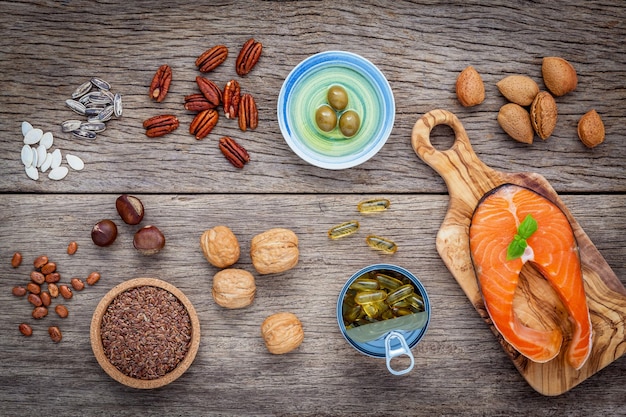Nutrition for Women Over 40: Vitality Through Hormonal Balance

Nutrition for women over 40 should focus on addressing hormonal changes, such as decreased estrogen, by incorporating nutrient-dense foods that support bone health, muscle mass, and overall vitality, while mitigating symptoms of perimenopause and menopause.
As women enter their 40s, nutritional needs evolve significantly due to hormonal shifts and metabolic changes. Understanding nutrition for women over 40: addressing hormonal changes and maintaining vitality is crucial for sustaining energy levels, managing weight, and ensuring long-term health and well-being. Let’s explore how to tailor that diet.
Understanding Hormonal Changes in Your 40s
Entering your 40s signifies a period of hormonal fluctuations that can impact various aspects of your health. A clear comprehension of these changes is the foundational step toward tailoring your nutritional strategy effectively.
The Role of Estrogen
Estrogen is pivotal in women’s health, influencing everything from bone density to cardiovascular function. As women approach perimenopause, estrogen levels begin to decline. This decline can lead to symptoms such as mood swings, hot flashes, and sleep disturbances.
Impact on Metabolism
Hormonal shifts can also affect metabolism, often leading to weight gain, particularly around the abdominal area. Understanding how these changes impact your body is essential for maintaining a healthy weight and energy levels.
- Prioritize lean protein to preserve muscle mass and boost metabolism.
- Incorporate fiber-rich foods to promote satiety and regulate blood sugar.
- Limit processed foods and sugary drinks that can contribute to weight gain.
By understanding the hormonal rollercoaster of your 40s, you can make informed dietary choices that support your overall well-being, manage menopausal symptoms, and sustain your vitality.
Key Nutrients for Women Over 40
Addressing the nutritional needs in your 40s involves integrating key nutrients that combat hormonal changes in your body. Focusing on these nutrients can help support you in this new phase of your life.
Calcium and Vitamin D
Bone health becomes increasingly important as estrogen levels decline. Calcium and vitamin D are essential for maintaining bone density and preventing osteoporosis. Incorporate dairy products, leafy greens, and fortified foods into your diet.
Omega-3 Fatty Acids
Omega-3 fatty acids are important for brain health and reducing inflammation. These healthy fats can improve mood, cognitive function, and heart health. Include sources like fatty fish (salmon, mackerel), flaxseeds, and walnuts in your diet.

Focusing on essential nutrients helps address the consequences of hormonal variations. Balancing these nutrients is a great step into prioritizing well-being.
Foods to Embrace and Limit in Your 40s
Your food selections play a crucial role in modulating hormonal fluctuations and sustaining vitality. Recognizing which foods to incorporate more frequently and those to restrict, is equally essential.
Embrace Nutrient-Dense Foods
Prioritize whole, unprocessed foods that deliver essential nutrients and antioxidants. Leafy greens, colorful vegetables, lean proteins, and healthy fats should form the foundation of your diet. These foods provide the necessary vitamins, minerals, and phytonutrients to support overall health.
Limit Processed Foods and Sugar
Processed foods, sugary drinks, and refined carbohydrates can wreak havoc on your hormonal balance and energy levels. These foods often lack essential nutrients and can contribute to weight gain, inflammation, and mood swings. Minimize your intake to stabilize blood sugar and reduce overall health risks.
- Opt for whole grains over refined grains to maintain stable energy levels.
- Choose natural sweeteners like honey or maple syrup in moderation.
- Limit alcohol consumption to support liver health and hormonal balance.
By consciously selecting nutrient-dense foods and minimizing processed options, you can significantly enhance your overall well-being. This empowers you to effectively manage hormonal changes.
The Importance of Protein for Muscle Mass
Preserving muscle mass becomes increasingly important in your 40s as it helps maintain metabolism, strength, and overall physical function. Protein intake is key to support those changes.
Why Muscle Mass Matters
Muscle mass naturally declines with age, leading to a slower metabolism and reduced strength. Adequate protein intake helps preserve and build muscle, which is essential for maintaining a healthy weight and staying active.
Incorporating Protein into Your Diet
Aim to include a source of protein in every meal to support muscle synthesis and satiety. Lean meats, poultry, fish, eggs, beans, lentils, and dairy products are all excellent choices. Vary your protein sources to ensure a balanced intake of essential amino acids.
Prioritizing protein intake is a proactive step toward preserving muscle mass, supporting metabolic health, and maintaining physical strength throughout your 40s, ensuring you can enjoy an active and fulfilling lifestyle.
Hydration and Its Impact on Hormones
Hydration is an often-overlooked aspect of nutrition that plays a critical role in hormonal balance and overall health. Ensuring adequate fluid intake can help mitigate symptoms of hormonal fluctuations and support various bodily functions.
The Role of Water in Hormonal Balance
Water is essential for transporting hormones throughout the body, regulating body temperature, and supporting detoxification processes. Dehydration can exacerbate symptoms like fatigue, headaches, and mood swings, which are common during hormonal changes.
Tips for Staying Hydrated
Aim to drink at least eight glasses of water per day, and increase your intake during exercise or in hot weather. Incorporate hydrating foods like fruits and vegetables into your diet, and limit sugary drinks and caffeine, which can contribute to dehydration.

Prioritizing hydration through conscious water consumption and incorporating hydrating foods will make you feel better, and improve hormone balance for an active and fulfilling life over 40.
Stress Management and Its Links to Nutrition
Managing stress is intertwined with nutritional well-being. Chronic stress can disrupt hormonal balance, impact digestion, and affect nutrient absorption. Integrating stress-reduction techniques with a balanced diet can positively impact the changes within your body in your 40’s.
The Impact of Stress
Chronic stress triggers the release of cortisol, a hormone that can increase blood sugar, suppress the immune system, and promote weight gain. Addressing stress through lifestyle modifications and dietary choices can mitigate these effects.
Nutritional Strategies for Stress Reduction
Incorporate foods rich in magnesium (leafy greens, nuts, seeds) and B vitamins (whole grains, lean meats) to support nervous system function and reduce stress levels. Practice mindful eating to improve digestion and nutrient absorption. Limit caffeine and alcohol, which can exacerbate anxiety and disrupt sleep.
- Practice regular exercise to release endorphins and reduce stress hormones.
- Prioritize sleep to support hormonal balance and overall well-being.
- Engage in relaxation techniques like meditation, yoga, or deep breathing exercises.
By integrating stress management practices with a well-balanced nutrition strategy, you can establish a harmonious relationship between your mind and body, empowering you to navigate the challenges of your 40s with vitality.
Supplements to Consider After 40
As diet becomes more conscious in your 40’s, supplements can provide extra nutritional reinforcements. While a balanced diet should be the foundation, certain supplements can help address specific needs and support overall health.
Multivitamins
A high-quality multivitamin can fill nutritional gaps and ensure you receive essential vitamins and minerals. Look for a multivitamin formulated for women over 40, with adequate levels of vitamin D, calcium, and B vitamins.
Magnesium
Magnesium is involved in over 300 enzymatic reactions in the body and is essential for bone health, muscle function, and nerve function. Many women are deficient in magnesium, so supplementation can be beneficial. Look for magnesium citrate or glycinate for better absorption.
Consulting with a healthcare provider or registered dietitian is crucial before starting any supplementation regimen. They can assess your individual needs, consider any underlying health conditions or medications you are taking, and guide you on the appropriate dosages and supplements to support your overall health.
| Key Point | Brief Description |
|---|---|
| 💪 Protein Intake | Essential for maintaining muscle mass and boosting metabolism. |
| 💧 Hydration | Supports hormone transport and detoxification processes. Aim for 8 glasses of water daily. |
| 🦴 Calcium & Vit D | Crucial for bone health and preventing osteoporosis. Include dairy and leafy greens. |
| 🧘 Stress Management | Reduces cortisol levels, improving hormonal balance. Try meditation and yoga. |
Frequently Asked Questions
▼
Focus on increased intake of calcium and vitamin D for bone health, lean protein for muscle mass, and omega-3 fatty acids for brain health. Limit processed foods and sugary drinks.
▼
Foods rich in phytoestrogens (like soy) and omega-3 fatty acids can help reduce hot flashes and mood swings. Staying hydrated and managing stress through a balanced diet can also help.
▼
A multivitamin formulated for women over 40, vitamin D, calcium, and magnesium are often recommended. Consult with a healthcare provider before starting any new supplements.
▼
Exercise is crucial for maintaining muscle mass, bone density, and overall health. Combine it with a balanced diet to maximize benefits, manage weight, and reduce stress.
▼
Hydration is vital for transporting hormones, regulating body temperature, and supporting detoxification. Aim for at least eight glasses of water daily to mitigate symptoms like fatigue and mood swings.
Conclusion
Prioritizing nutrition during your 40s is an investment in long-term health and vitality. Making conscious dietary choices, managing stress, and staying active can help you navigate hormonal changes and enjoy a vibrant, fulfilling life.





